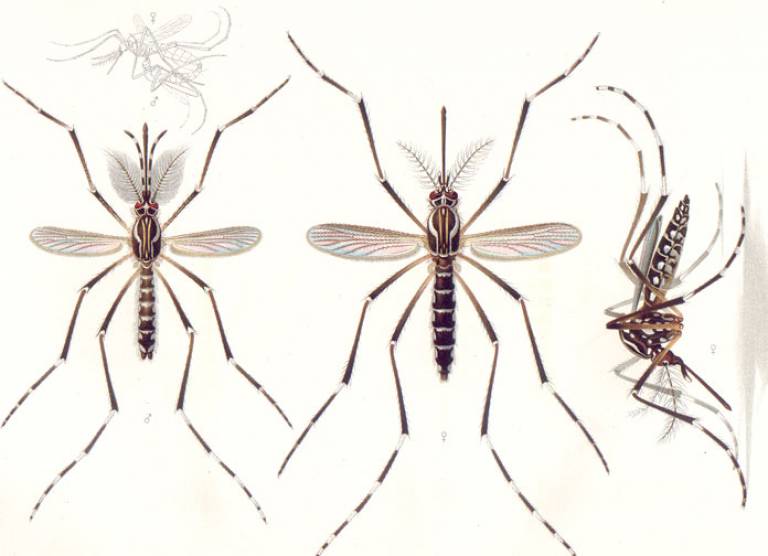Mosquito Research - From Sensory Biology to Vector Control
07 September 2019–08 September 2019, 8:45 am–5:45 pm

Funded by the BBSRC this symposium brings together sensory and behavioural biologists, basic researchers and interventionists from all over the world.
Event Information
Open to
- Invitation Only
Organiser
-
Joerg Albert & Chun-Hong Chen
Postdoctoral researchers or PhD students interested to attend (and present their work at) this event are invited to apply by submitting the title and abstract (150-250 words) of their proposed poster presentation to j.bagi@ucl.ac.uk. Applications must be submitted by Sunday, the 25th of August, 2019 (midnight). Applicants will be informed about the outcome of their applications on Tuesday, the 27th of August, 2019.
Symposium abstract:
Across the globe, mosquitoes act as carriers of many fatal diseases. Malaria alone caused almost 500,000 deaths in 2016 with 91% of those occurring in sub-Saharan Africa. Leishmaniasis, a disfiguring parasitic disease, infects a million across the tropical and subtropical regions of the world and more than 10 million people are at risk of potentially life-threatening diseases such as Dengue, Chikungunya, Yellow Fever or Zika. All these diseases have one thing in common: they are carried by mosquitoes. Remarkable progress has been achieved in the last decade in reducing the morbidity and mortality arising from mosquito-borne diseases. Growing resistances, of both pathogens and mosquitoes, however, are threatening to undo this progress. Novel disease control strategies are needed. One branch of global research activity is focusing on the common denominator of all mosquito-borne disease, namely the mosquitoes themselves!
The behaviour of mosquito disease vectors is still poorly understood. A deeper understanding, however, will be crucial for the success of all future vector-based intervention strategies aimed at either disease control – or disease elimination. This workshop assembles world-leading mosquito researchers in an effort fill this gap.
Mosquitoes are highly adaptive organisms. Their multiple behavioural adaptations to current intervention strategies make a compelling case for identifying, and testing, novel tools, which target different mosquito behaviours. Here, swarming and biting behaviour have emerged as two possible candidates. Impairing mating swarms would have a clear effect on reducing mosquito populations regardless of the time of day (or place) where mosquitoes bite. Impairing biting behaviour, in turn, could take humans out of the vicious disease transmitting cycle.
UK currently hosts some of the leading centres in mosquito research and particularly the development of novel genetic interventions to control mosquito populations. The possibilities to collaborate that this environment offers are extraordinary. We would like to use this workshop to facilitate such collaborations by bringing together sensory biologists and behavioural biologists, basic researchers and interventionists from all over the world. The contributions of, and interactions between, the participants will help to form a new transdisciplinary research platform, which can tackle the challenges of a future world, where climate change keeps extending the geographic ranges of mosquito vectors …and their diseases.
In association with:


Image credit:
- Top: Aedes aegypti (Yellow fever mosquito), with male on left with bushier antennae. (Credit: E. A. Goeldi (1905) Os Mosquitos no Pará, Source: Wikimedia Commons)
 Close
Close

